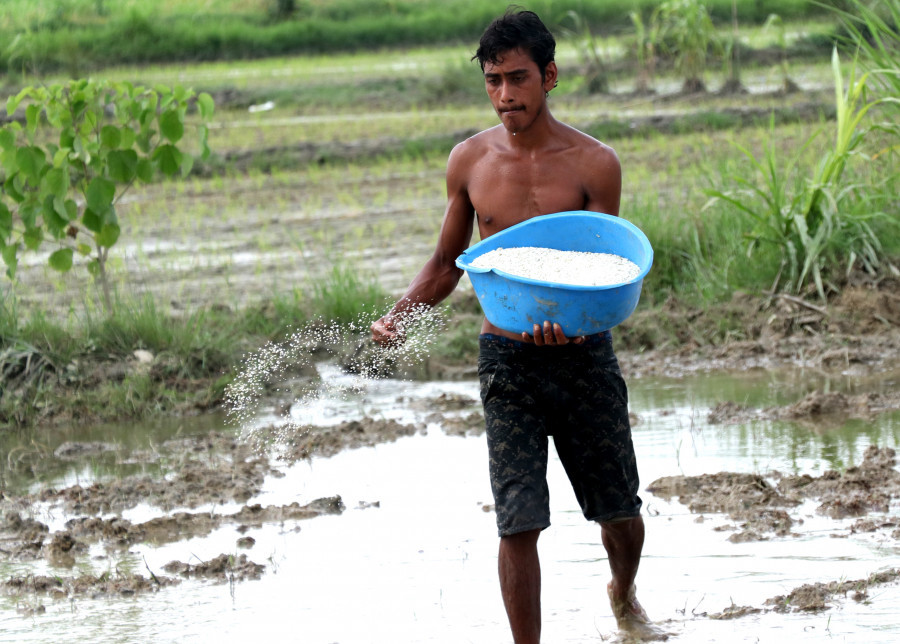Money
Farmers may not face fertiliser crisis this year with record-high imports in the pipeline, officials say
But there are worries about fulfilling demand for fiscal year 2021-22, beginning mid-July, as global prices of the vital farm inputs have shot up.
Sangam Prasain
Last year, the government faced massive criticism for not being able to supply enough chemical fertiliser during the peak paddy transplantation season.
Despite a severe shortage of fertiliser, farmers recorded a larger harvest backed by the availability of adequate farm workers and rainfall.
The outlook for the availability of fertiliser this year, however, is much better, according to authorities. There is both adequate stock of the vital farm input and firm orders have been placed.
“We are optimistic that the fertilizer supply in the fiscal year 2020-21, ending mid-July, will reach a record 500,000 tonnes,” said Yogendra Kumar Karki, secretary at the Ministry of Agriculture and Livestock Development.
Following its failure last year, the government took several measures to supply chemical fertiliser to farmers on time and as a result, this June, when thousands of farmers will start paddy transplantation, they are likely to get a huge respite.
“It’s because we received a bigger budget from the government to increase the amount of the state-subsidised fertiliser,” said Karki.
The government has allocated Rs11 billion in fertiliser subsidies for this fiscal year, up from Rs9 billion last fiscal year. The value of total imports of chemical fertilizer hovers around Rs19 billion annually.
According to the Agriculture Ministry, the annual demand for chemical fertiliser currently stands at more than 700,000 tonnes while official imports are just around 300,000 tonnes. Subsidised fertiliser fulfils 40 percent of the country’s total requirement while the rest is met by informal imports or shipments smuggled across the open border.
Last year, farmers encountered fertiliser shortages right from the beginning of the planting season in June. First, there was a short supply of diammonium phosphate (DAP), as the Covid-19 pandemic disrupted the global production and supply chain.
Then a shortage of urea appeared during the time for the first and second top dressing. In response, the then minister for agriculture Ghanashyam Bhusal promised to bring urea from Bangladesh and requested a shipment of 50,000 tonnes.
This import from Bangladesh is also due soon.
“The 50,000 tonnes of chemical fertiliser has started coming from Bangladesh to boost our reserve,” said Karki.
In many districts last year, farmers were forced to buy urea smuggled from India by paying a black market price of Rs50 per kg following a nationwide shortage, according to ministry officials. The fertiliser costs Rs14 per kg at the government subsidised rate.
According to the ministry, last year’s fertilizer import fell short to 250,000 tonnes.
The restriction in the southern border to prevent the spread of Covid-19 compounded the problem further resulting in a severe fertilizer shortage. The pandemic, on the other hand, had made more farm workers available because would-be migrant workers were forced to stay in the country because of entry restrictions in labour destination countries.
Karki said that the country currently has 80,000 tonnes of fertiliser in stock, while 200,000 tonnes, including 50,000 tonnes from Bangladesh are expected to arrive within a few weeks.
“This amount will be enough for the paddy transplantation period,” he said. “The tender process to import another 200,000 tonnes by June-July has also started.”
Paddy is transplanted in June and harvested in November. In between, the top dressing is done twice, the first time three weeks after transplantation and the second eight weeks after that.
Although there may be a respite in the supply of fertiliser this year, there are worries about fulfilling demand next year as global prices of the vital farm inputs have hit a record high.
“We are also cautiously looking at the global trend,” said Karki. “We are expecting that the price may drop to some extent within a few months. If not, the government should increase the budget for subsidy.”
He said that an estimated Rs16 billion in fertilizer subsidies would be required for the next fiscal year, beginning mid-July, if the global price remains at the current level.
According to reports, prices of diammonium phosphate, the world's most widely used fertilisers, jumped by a steep 49 percent in March compared to the same period last year. The global average price of diammonium phosphate in March averaged $609 per tonne, up $200 per tonne from March last year.
Similarly, the price of urea jumped 28 percent year-on-year in March. The average price of urea in March is $474 per tonne in the global market, a rise of $105 in a year. The price increase partly reflected higher input costs, especially energy, as prices of several energy benchmarks have doubled since May last year.
During the last monsoon, the heavens opened up and Nepal received 31 percent more rainfall than usual, helping cultivators to achieve a better-than-expected harvest despite running short of fertiliser.
According to the estimates of the Ministry of Agriculture and Livestock Development, farmers harvested 5.62 million tonnes of paddy this fiscal year, up by a marginal 1.28 percent compared to last year.
According to officials of Agriculture Inputs Company and Salt Trading Corporation, plant nutrients have become very expensive worldwide, but supplies in Nepal would not be affected for this fiscal year as shipments are already on their way.
The two state-owned companies are the only suppliers of chemical fertilisers to Nepali farmers. Salt Trading Corporation has been authorised to import 30 percent of the country's fertiliser requirement and Agriculture Inputs Company imports the rest.
This year, out of planned imports of 500,000 tonnes of chemical fertiliser, Salt Trading Corporation has been assigned to import 150,000 tonnes.
The Agriculture Inputs Company had, for the first time last year awarded Nepali private companies contracts to supply fertilisers but they failed to supply it, leading to scarcity. Two companies that failed to honour their contracts have been blacklisted for a year.




 9.7°C Kathmandu
9.7°C Kathmandu















